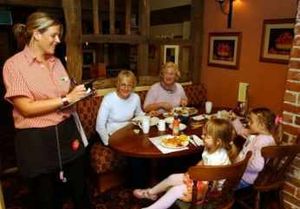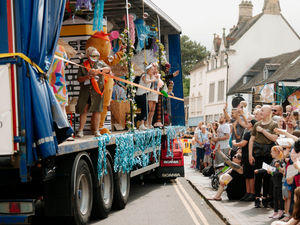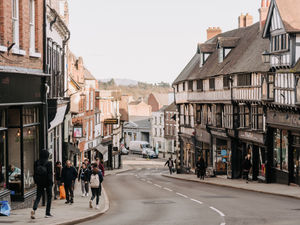To tip or not to tip?
Ben Bentley looks at the minefield surrounding whether or not we should leave restaurant staff a tip after enjoying a meal.

It's a kind of restaurant reservation, but not as we know it.
To tip or not to tip, that is the question. And it seems we Brits still don't know the answer.
The consumer watchdog Which? recently conducted a survey on our tipping habits to coincide with the launch of The Good Food Guide 2009 – and stirred up some unedifying findings.
Half of all customers wouldn't ask for a service charge to be reduced or removed from their bill if they had poor service in a restaurant.
Graeme Kidd, one of the organisers of the Ludlow Food Festival which also holds competitions for waiters, says we Brits are still very much reserved when it comes to the thorny issue of tipping and paying service charges.
"In America anything less than 10 per cent is considered an insult, but the quality of service is usually higher because the waiters know their earnings are larger through their tips," he says.
"Here we are all very reserved in our Anglo-Saxon way of complaining – the thing to do is look to see if a service charge is included, but you still don't have to pay it if you get bad service.
Reward
"On the other hand you can tip on top of a service charge if you feel you are getting really excellent service."
He adds: "If you reward good service it motivates people to give good service. Ten or 12 per cent is a reasonable starting point but it could depend on how much the meal is – if you pay £800 for a meal do you want to pay £80?"
Liz Carter, editor of The Good Food Guide 2009, says service charges are optional and customers have every right to deduct them if they haven't had a good service.
"But many people are reluctant to put themselves in such awkward positions," she says, largely summing up the British character.
Ah, the British character. Heaven forbid that we are seen in public with egg on our faces, so we dab our stiff upper lips with neatly folded napkins and smile nicely - the smile of a nation that swallows its pride for pudding.
And only later does our inaction give us indigestion, when the waiter dishes up the same perpetual bad service because he misinterpreted our previous tip as a compliment to his ability to turn tables.
Maybe we should take a leaf out of Raymond Blanc's hit television series The Restaurant. In the latest series of his reality cookery show, the famous French restaurateur took dining room etiquette further by inviting customers to pay only what they think their experience is worth.
But if half of us are too reserved to ask for a reduction or removal of a service charge, according to Which? some 25 per cent choose to tip on top of service charges.
Double tipping? Warning: this can even happen without people realising, for instance if a credit card slip or machine is left open for a tip when service charges have been added.
Other findings from the study are that three quarters of restaurant goers say they tip sometimes, and 85 per cent varied the amount depending on the quality of service.
More than ten per cent say they normally leave a tip of 10 per cent or more, while one if five of us choose smaller amounts of around five per cent, even if they receive good service.
According to the Which? report, one restaurant inspector says: "Service charges are rarely excessive but they have crept up in recent years to 12.5 per cent.
Tipping is certainly a hot potato. The concept, which is designed to reward good service and bump up pay for waiters and waitresses, made headlines earlier this year when it was revealed that tax rules allow restaurants to use tips to top up staff wages processed through payrolls to meet the national minimum wage of £5.73 an hour – a loophole the government is expected to close next year.
As lecturer and food and beverage manager for the catering school and restaurant at Shrewsbury College of Arts and Technology, it's part of Davinia Slade's job to train up waiting staff.
She says: "A lot of people don't tip in this country, I just don't think it's something we do.
"They are quite important because it shows appreciation, but it depends whether the hotel or restaurant deal them out – do they keep them or 'divi' them up?
"I think people should know where they go because if you get good service you want to reward the person for it."
She adds: "I tip in restaurants but again I don't know if that person is getting it or it goes into a central pot, but I work in the industry and it's nice when we show our appreciation."
Will Holland, head chef at La Becasse in Ludlow, the fine dining restaurant that holds three AA rosettes, says a 10 per cent discretionary service charge is included on the bill. He says This is done to make extra payments to waiting staff easier to manage and distribute.
Will says: "If you go to a restaurant that prides itself on good service, like we do, I don't think it's cheeky to put a 10 per cent service charge on there. But it is discretionary. If people want to pay less it's up to them."
Some eateries, however, can be cheeky with their service charges and customers might be advised to be eagle-eyed with their bills.
"I went to a pub and ordered my food at the bar and paid in advance and there was a service charge," Will adds. "I questioned what service I had received because there was not a service to speak of."
So there's a tip – speak out against bad service by not paying extra for it, and speak up for good by proffering pennies and pounds. It will turn the tables in everyone's favour in the long run.




